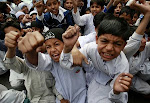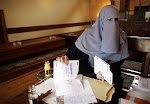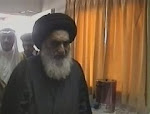Muslim men are able to rape very young girls in the name of Islam. This pedophilia began with Old Mo himself taking Ayisha at the age of nine. The age of marrying in Iran and other muslim countries.
Zainab ran away from home, not because she was a rebellious child, a truant or a wayward girl. She was only 12 yeas old, and her parents had accepted her bride price from Alhaji Sabo, a man who was old enough to be her grandfather.
She ran away from home because she did not want to be married off. Zainab wanted to attend school and read to become a lawyer. But her culture and tradition frown on her dreams.
window.google_render_ad();
In Northern Nigeria, especially amongst the traditional Hausa tribe, Zainab at twelve is ripe for marriage.
When Zainab ran away from Home, in protest of her cultural destiny, the leaders of her community cursed this age and time in which we live. Her parents would not fathom Zainab’s reasons for running away from home.
‘Alhaji Sabo was a rich man, he would have taken good care of Zainab and help us out of this poverty,’ her mother lamented.
The Islamic cleric too accused Zainab’s parents of bad child upbringing.
Young girls from the Northern Nigerian tribes are given into marriage at very young ages. Some are given into marriage as early as 11 years. It is believed that the longer a girl is unmarried, the higher the risk of her becoming promiscuous.
Some Islamic clerics say that it is in order to prevent the shame of pregnancy- out of wedlock, that they marry the girls off so early.
According to some Hausa/Islamic traditionalist, pregnancy before marriage remains the worst shame a girl could bring to her family, and to safeguard their honor, a family marries out their young daughter, once they began to develop sexuality.
For most of it, the less privileged families like Zainab’s, marry their daughters off to men with reasonable means of livelihood who can secure better living standards for the young girl and help bail them out of poverty.
Bizarre tradition
This bizarre tradition sees about 30 percent of pre-teen girls of the Hausa tribe of Nigeria given in marriage to much older men. The young girls are married off before they are old enough to get into high school.
This cultural and religious norm of the Hausa people is considered abusive and unhealthy for the child (female child) but it is highly encouraged by the Islamic clerics, parents and state parliamentarians in northern Nigeria.
This long-held cultural values - and poverty - now dictate the futures of most young girls of the Hausa tribe, including Zainab‘s.
Should UNICEF and other NGO’s back-off, or give up on the children (Female children) who have been denied and are being denied their rights to an education, their rights to a healthy life and their rights to protection, amongst other rights of theirs that is being abused under this traditional practice?
UNICEF, UNESCO and every other Organization concerned about children, must continue to find ways to rescue these young girls from such unhealthy practices.
According to some statistics, almost 12 million under fifteen aged girls are denied education because they are married off to satiate older men while their parents hope to gain some financial compensation.
Zainab found
Without education the lives of such girls are reduced to that of dependence and subservience. However, most of the girls who choose to flee their communities in order to avoid early marriage, like Zainab, face another chapter of problems and challenges.
From the torments of early and arranged marriage Zainab was later found on the ravenous streets, where she landed, begging for food and money. She was exposed to rape, sexual exploitation and all forms of danger. Her dream of reading to become a Lawyer could never be realized from the situation she had found herself.
All the twelve year old Zainab wants is a ‘normal’ life.
For the thousands of average Hausa girls facing this non-fictional challenge of legalised paedophilia, the society needs to draw a line between cultural norms and human and rights, between traditional practices and social/civil rights, in the dawn of the growth and development of humanity.
12 years ago























